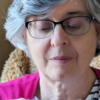People who are blind or vision impaired are three times more likely to experience loneliness and isolation (1). A reason to get out can help tackle it, so we’re funding bright ideas that encourage that.
How do you relax? Everyone is different. For some, a walk in nature is therapeutic – something many discovered during the pandemic. Evidence is growing that walking in nature helps with depression (2). But benefiting from immersing yourself in the great outdoors can be more challenging when you’re living with vision loss.
Our research ‘Outside’ has confirmed that for people who are blind or vision impaired, it can be harder to engage in activities others may take for granted. This report, funded by Fight for Sight, explores people’s experiences of loneliness and isolation and included some stark feedback from individuals about the challenges of getting out of the house and socialising.
The research, conducted by researchers from Abertay University, found that people who are blind and vision impaired face barriers to getting out and about that fall into two broad categories:
• Internal – Many face feelings of anxiety and depression because of being isolated or lonely.
• Physical - Including factors related to travelling or specific locations –. Crucially, according to the report, these barriers can be actual or perceived.
A natural solution
Integral to our mission, is using research and evidence to guide our funding. That’s why we’re supporting work that improves the options available to blind and vision impaired people, smoothing the way to participation in activities and engage with the local environment.
Since publishing Outside, we’ve distributed almost £450,000 to 17 projects across the UK (correct as of September 2024). Just one example is a fantastic project to set up social walking groups in local green spaces in the county of Oxfordshire.
MyVision Oxfordshire masterminded its Green Walks programme in response to a report by Natural England: Enhancing Access to Green and Blue Spaces for People with Vision Impairment, which we were pleased to participate in. The report highlighted that certain groups face significant barriers when it comes to experiencing the enjoyment and benefits of natural spaces.
Born from this research the programme has a focus on the impact of being outdoors and walking. Each walk is an exercise in gathering data and evidence so that MyVision Oxfordshire can build a framework for other organisations and councils to replicate in their areas.
The groups are predominantly peer-led and meet every two weeks. The length and location of the walks are decided by the group members, and usually start and finish at a favourite coffee shop.
Mark Upton from MyVision Oxfordshire who has watched the groups flourish, said: “With time the walks organised by the group members have increased in length, up to a five mile walk in some cases. And this shows how, alongside physical fitness, people’s confidence has grown.
“Initially when creating the programme we thought we may need to arrange a sighted guide for some of the routes but the groups have what they affectionately term ‘collective vision’ – amongst them they have the vision and knowledge they need to organise their own walks and to explore further afield.
“One group got bored of their local route and when discussing their next walk they decided to head to a local castle. In order to do that they needed to catch a bus. One of the members hadn’t been on a bus for 15 years – since she had lost her sight – but as a group they travelled together to the location, and now she regularly takes the bus by herself.”

“With time the walks organised by the group members have increased in length, up to a five mile walk in some cases. And this shows how, alongside physical fitness, people’s confidence has grown."
Green Walks have been revolutionary to Susan
(this features parts of Susan’s story, shared with MyVision Oxfordshire, you can read her full story here).
Another regular walker, Susan, registered partially sighted in 2020 due to Myopia (short-sightedness), felt she was losing her independence and was becoming increasingly more hesitant to leave the house. Then she joined the Abingdon Green Walks Social Group and felt a real shift in her outlook and quality of life.
After a few trips out with the group, Susan has found the Green Walks give her a chance to go for walks outside in a quiet area, free of traffic, and the city bustle; she finds the green areas very enjoyable to walk around in and since joining the group she feels that she has got a lot more exercise.
She went on to say: “One of the most beneficial things for me has been talking with other people. Even though we all have sight loss, everyone has had very different experiences, and it has been very beneficial to hear different people’s perspectives.”
This is just one of the many projects and organisations we are funding. Please do sign up to our newsletter to stay up to date on the ways your donations and our funding are putting change in sight.

Join our free webinar
Hear more about Green Walks from MyVision Oxfordshire in our November webinar.

Related content


